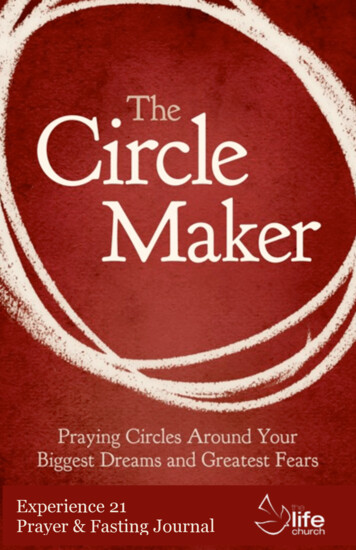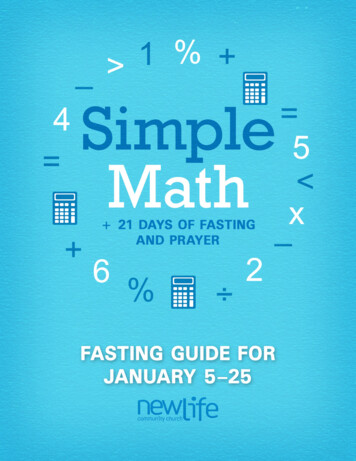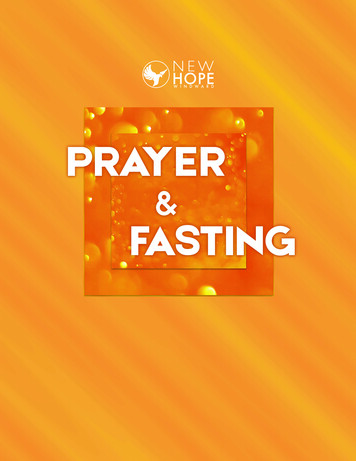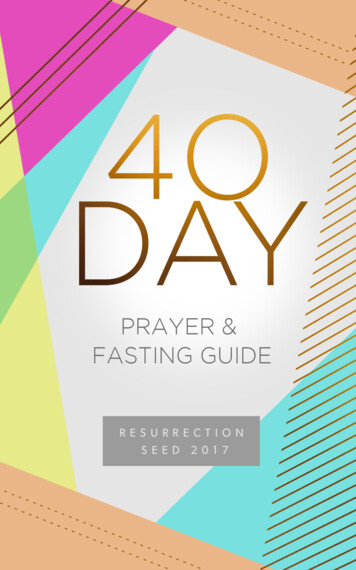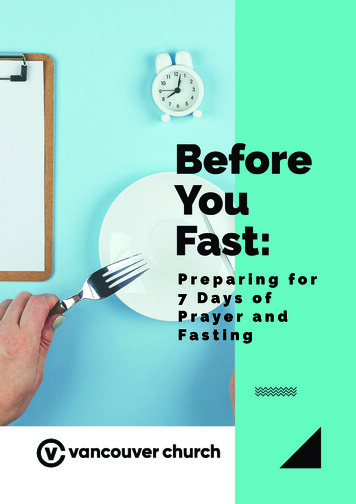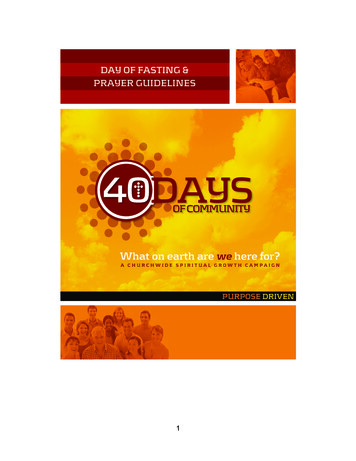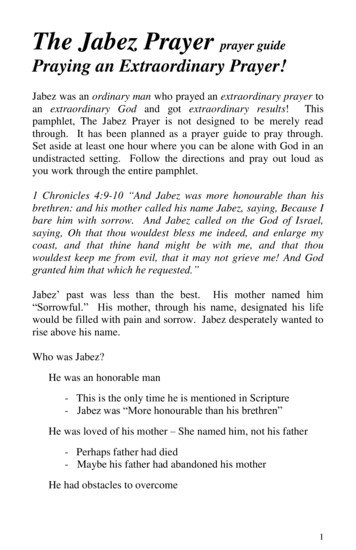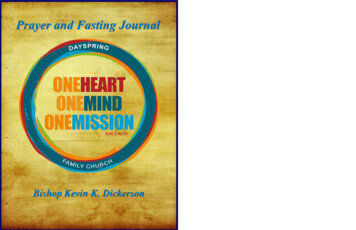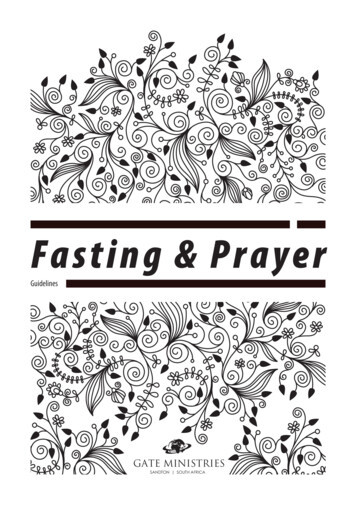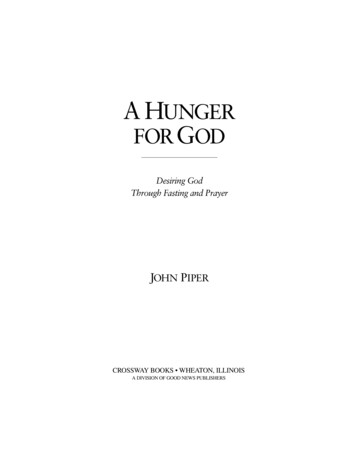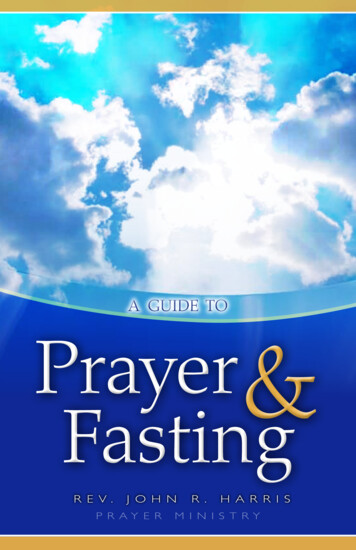
Transcription
A Guide toPrayer&FastingR e v.J o h np r ay e rR .H a rr i sm i n i s t r y
Aintroductions we begin this journey of faith, Beyond All Limits,we invite you to join us in a time of prayer andfasting. It is a privilege to pray to our heavenly Father withexpectancy. In John 14:13, Jesus said, “And whatever you ask inMy name, that I will do, that the Father may be glorified in theSon. If you ask anything in my name, I will do it.”Although fasting is an almost forgotten practice, thisbiblical foundation is an important part of worship andprayer. Fasting helps us to focus on matters of the Spirit.The late Dr. Bill Bright, founder of Campus Crusade ofChrist, said,“I believe the power of fasting as it relatesto prayer is the spiritual atomic bomb that our Lord hasgiven us to destroy the strongholds of evil and usher in agreat revival and spiritual harvest around the world.”We are in a season of exponential opportunity to trustin God, to believe in Him and to hope in Him for morethan we could ever imagine. Recall that when Nehemiahsaw the walls in disrepair, he was compelled by Godto pray and to fast for the restoration of the city to theglory of God. We pray that God would call each of us to adeepening of our faith in Him through prayer and fasting.2in-
Prayer & FastingWe pray that this book will encourage you to pray and toseek God as never before. We pray that He would enableus to each do our God-given part— just as Nehemiahand his colleagues used their God-given gifts to restoreand revive a city and nation.Our prayer is that as we continue in this spiritual journey,we will continue to know that the “effective, ferventprayers of the righteous avail much.” May we be faithful,as in the days of Nehemiah, to pray and fast. May God dothrough us only that which He can do. May all the glorygo to Him, and may all who see the work give praise toour great God.ductionThank you for joining us in this journey, and may Godrichly bless you.3
What Is yoursPIrItualcondItIon?Preparation for a meaningful fast begins with repentance andconfession. Do not expect God to violate His own stated willconcerning the prayers He can hear. If you have unconfessed sin inyour heart, He will not hear you (Psalm 66:18; Isaiah 59:2). Iniquityis unconfessed sin. Don’t waste your time fasting and praying ifyou have decided not to confess all known sin to Him. Here areseveral things you can do to prepare your heart:Ask God to help you make a comprehensive list of your sins.Confess every sin that the Holy Spirit calls to your remembranceand accept God’s forgiveness. (1 John 1:9)Seek forgiveness from all whom you have offended and forgive allwho have hurt you. (Mark 11:25; Luke 11:4; 17:3–4)Make restitution as the Holy Spirit leads you.Ask God to fill you with His Holy Spirit according to His commandin Ephesians 5:18 and His promise in 1 John 5:14–15.Surrender your life to Jesus Christ as your Savior and Lord.Develop utter dependence on Him with total submission andhumility. (John 5:15)Study the attributes of God.Begin your time of fasting and prayer with an expectant heart.(Hebrews 11:6)Hunger and thirst after righteousness. (Matthew 5:6)Do not underestimate spiritual opposition. Satan sometimesintensifies the natural battle between body and spirit.(Galatians 5:16–17)4A
Prayer & FastingAFrom StartTO Finishchallenging part of prayer and fasting is taking your focusoff the world and toward God. Many things distract us fromtime alone with God: work, leisure, worries, social and civiccommitments, even church activities. In Hebrews, these itemsare labeled as “every weight that slows us down.”Therefore, since we are surrounded by such a huge crowd of witnesses to thelife of faith, let us strip off every weight that slows us down, especially the sinthat so easily hinders our progress. And let us run with endurance the racethat God has set before us. We do this by keeping our eyes on Jesus, on whomour faith depends from start to finish.—Hebrews 12:1–2The author uses the analogy of a race to depict the believer’slife of faithful living. In the grandstands are all the faithfuldisciples who have run before us, encouraging us to run strong.Before us is the track, one prepared beforehand by God. Atthe end is the finish line, where Jesus is standing, waiting tocongratulate all who cross it. What prevents us from reachingthe finish line? The author tells us that it is weight and sin. Sinis obvious to us all. A life of faith must be lived in obedience toGod’s Word. But what about the “weight that slows us down”?Because this weight is not as obvious, it is what interferes mostwith reaching the finish line.The author coaches us to lay off “every weight that slows usdown.”The image is of a runner taking off his warm-up clothesso he is left with only his running attire.By doing so, he has nothing to encumber him during the race.The weight in your life is not sin. Rather, it is anything thatkeeps you from running the race set before you, anythingthat keeps you from achieving all that God wants to do inand through your life, and ultimately in and through ourchurch. This weight normally comes in the form of goodthings but becomes a distraction to our spiritual growth. Theseare the things that we must lay down so that we may rununencumbered in our race of faith.5
whyPart of prayer and fasting is creating an environment in whichwe can encounter God. You also may be called during this timeof prayer and fasting to set aside some good things to allowyourself more time with God.What distracts you from time with God? Look over the listbelow and commit to set aside some normal activities to giveyourself more time for prayer, Bible study, silence and solitude:TelevisionComputer/video gamesWatching sportsReading the newspaperShoppingSurfing the InternetGolfCooking/entertainingInformation, e-mail, pagerMoviesLeisure readingWorking outYard workHobbiesDecoratingTalking on the phoneGoing to the mallMusicAsk God to reveal some areas that you can periodically setaside in order to spend more time in prayer. As we throw offwhat slows us down and the sin that hinders our progress,we will find ourselves able to spend more time at the foot ofthe throne of God, seeking His face, listening to His Word andbeing equipped to persevere and to run our race.Only as we focus our lives on Him can we hear His plan for ourlives individually and corporately as the body of Christ.The Ministry of PrayerAwhy pray?s stated earlier, prayer is about spending time with God, unitingour hearts with His. It is our love for God and a desire to knowHim more that leads us to pray. J.I. Packer comments in hisbook Knowing God,“Men (and women) who know their Godare before anything else people who pray, and the first pointwhere their zeal and energy for God’s glory come to expressionis in their prayers.”6B
y fastPrayer & FastingWhile most Christians understand the basic truths aboutprayer, most of us find great difficulty devoting time to itevery day. It is true that a close, personal walk with the Lord isimpossible without daily quiet time—a time of listening andspeaking to our heavenly Father. None of us would expect tomaintain a good relationship with a wife or husband or closefriend if we never spoke to that person. How much moreimportant is it to seek to be near the One who made us andwhose will and work we desire to do?Likewise, it is impossible for the body of Christ—the church—to stay on course if we do not faithfully and regularly uniteour hearts and voices in prayer for the guidance of the HolySpirit in our decisions and our actions. We pray because Jesustold us to pray. We pray because Jesus Himself prayed. We praybecause it changes us, and we pray because it brings about thewill of God in our family, church and in our society. That is why,during these exciting days, our Pastor is leading us to a newlevel of commitment to prayer. Every member is being asked tojoin in all the collective times of prayer with the entire body ofChrist, as well as in personal times of prayer.You are being asked to pray, but you are also being asked to fast.The Ministry of Prayerwhy fast?Biblically, prayer and fasting go together. And as with prayer,fasting is about God. However, in our day, the biblical principleof fasting has been almost forgotten. Throughout history, God’speople have made fasting an important part of their worship andprayer. Fasting is God’s way of helping us focus on matters of theSpirit; it enables us to gain control of our appetites so that wecan direct our mental and spiritual energies toward Him.Those who have experienced the power and blessing offasting testify that it is far more than a religiousexercise or discipline. Recall what Dr. Bright saidabout the power of fasting as it relates to prayer.–continued, next page7
“THe called it the “spiritual atomic bomb that our Lord has givenus to destroy the strongholds of evil and usher in a great revivaland spiritual harvest around the world.”What a statement! After Dr. Bright engaged in a 40-daypersonal fast, during which God gave him the vision to callchurches and individuals to times of fasting and prayer on anunprecedented scale, he stated:This proves to be the most important 40 days of my life. As Iwaited upon the Lord, the Holy Spirit gave me the assurancethat America and much of the work will . . . experience a greatspiritual awakening . . . But before God comes in revival power,the Holy Spirit will call millions of God’s people to repent, fast,and pray in the spirit of 2 Chronicles 7:14:If My people, who are called by My name, will humblethemselves and pray and seek My face and turn from theirwicked ways, then I will hear from heaven and will forgivetheir sin and will heal their land.The scope of this revival depends on how believers in Americaand the rest of the world respond to this call.Our Pastor is calling us to pray and fast for spiritual revival inour families, our church, our community and beyond. We arecalled to seek the Lord as never before as a church body, toask God’s spirit to renew and revive us again for His purposeand plan in our personal lives and in the corporate life of ourown church. As we consider further growth, we are askingGod to truly take us beyond all limits as we reach out to ourcommunity. The task is huge; it is bigger than any of us; it isGod-sized. Therefore, we are being called to fast and pray forGod’s purpose and plan to be accomplished.why fastHow we respond, individually and collectively, will determinewhether our church will be in the center of revival, spiritualawakening and the greater works God has planned for us.8
Prayer & FastingTWhat is fasting?o fast” means primarily “not to eat.” Biblical fasting alwayscenters on spiritual purposes. Fasting normally involvesabstaining from all food, solid or liquid, but not water, for adetermined amount of time with specific spiritual goals. Athorough definition might be: “The fast is an act of the willthrough which the individual Christian exerts spiritual controlover the flesh (through not eating, or through the laying downof other distractions and hindrances) with a view to a morepersonal and powerful experience with God in prayer.” Itinvolves giving up the physical to attain the greaterspiritual insights.Is fasting for today?In his book Celebration of Discipline, Richard J. Fosterwrites:“The constant propaganda fed us today convincesus that if we do not have three large meals each day,with several snacks in between, we are on the vergeof starvation. This, coupled with the popular beliefthat it is a positive virtue to satisfy every humanappetite, has made fasting seem obsolete.”We need to realize several things about fasting as we try toanswer that question.Is fasting biblical?The list of biblical characters who fasted includes such greatsas Moses, David, Elijah, Esther, Daniel, Anna, Paul and JesusChrist the incarnate Son. Many well-known Christiansthroughout church history fasted and gave testimony to itsvalue and power. Among them were Martin Luther, JohnCalvin, John Knox, John Wesley, Jonathan Edwards and DavidBrainerd.9
FWhich scripturessupport fasting?asting has solid scriptural roots. Here are severalexamples of fasting:In the book of Joel, God called His people to fast andpray for a time of repentance, personal commitment andrevival among the people.The people of God faced national extinction in the daysof Esther the queen. Esther called for her own people torespond with a fast in Esther 4:16. God called His peopleto pray and fast during a major crisis, and God deliveredHis people.Ezra proclaimed a fast for protection as the peoplereturned to the land following the rebuilding of thewalls. God heard, and He answered by giving themsupernatural protection (Ezra 8:21).When Daniel was faced with spiritual battles, he fastedand prayed: “In those days, I, Daniel, was mourning threefull weeks. I ate no pleasant food, no meat or wine cameinto my mouth, nor did I anoint myself at all, till threewhole weeks were fulfilled,” (Daniel 10:1–2).Joel called a national fast at the beginning of a locustplague.“Consecrate a fast, call a sacred assembly; gatherthe elders and all the inhabitants of the land into thehouse of the Lord your God, and cry out to the Lord,”(Joel 1:14). We may never see a plague of locust, butwe are seeing a plague of unrighteousness. Abortion,pornography, violence, terrorism and lawlessness showthe rebellion of the people against God’s Word.Is fastingappropriate today?es, it is! Our nation is in need of revival. Our world isin desperate need of salvation from the bondage of10
Prayer & Fastingun-righteousness. Our church is in need of protection,direction Spirit and power as we strive to do great thingsfor the Kingdom of God in this world. Our families arein need of direction, support and protection to stand firmand equip future generations of believers.SpiritYes, fasting is for today, and it is for the now!Has the holy spiritcalled you?Fasting should be a response to the prompting ofthe Holy Spirit and a desire for obedience. It is not tobe practiced as a current fad and certainly not to pleaseothers or to meet a goal. It will most likely come becausethe Holy Spirit has shown you a specific need that calls forintense, focused and uninterrupted praying on your part.Because all fasting must be God-inspired and Godordained, our prayer is that the Holy Spirit will initiatewithin us a desire to pray and fast on behalf of all that Godis doing and wants to do in our world, our church and ourlives. As we are faced with a spiritual crisis in our country,our task to be a light to others becomes even more urgent.Our prayer is that God will call you to join us in prayer andfasting for First Baptist Orlando and our country.What is yourphysical condition?There are some people who should not fast(diabetics and those with other problems, as advisedby a physician). But a healthy person of any age shouldbe able to fast. What we call “hunger” is really appetite.The healthy body can withstand long periods withoutsolid food; however, liquids—water and juices—shouldbe available. There are books, such as Dr. Brights’s TheComing Revival, that contain information on the physicalaspects of fasting.11
What kind offast shouldyou do?There is no better time than now, both personally andcorporately as a church, to fast on a regular basis. If youhave never fasted, below are several options that you canconsider. Ask the Holy Spirit to lead you to a decision asto which fast might be best for you to practice.Option 1—You can choose to fast (abstain from solid foodbut drink fruit or vegetable juices as well as water) forone day. This could mean you would eat dinner one day,then not eat solid food again until dinner the next day.You would be missing two meals. You could also fast fromlunch one day until lunch the next day.Option 2—You can choose to do a 24-hour fast. Thisusually does involve some hunger pains or discomfortbefore the time is up, but the spiritual benefits can bewonderful.Option 3—Another option is a three-day fast. Athree-day fast is an acceptable way for a Christian todemonstrate the seriousness of purpose and depth ofcommitment that responds to a serious challenge.Option 4—Longer fasts of a week, two weeks, a monthor 40 days have proven to lift the participant to a very highlevel of spiritual awareness and responsiveness to God. Thelonger fasts should generally be undertaken only by thosewho have first engaged in shorter periods of fasting andhave learned how their bodies react to the process of fasting.Option 5—Consider a “hindrance fast” of the distractionsof the world. Following Hebrews 12:1–2, which stateswe should lay aside that which so easily ensnares us,you may want to pick several activities to abstain from,and use that time to seek God. Even good activitiescan distract us from the best. You can consider a timeaway from television, leisure reading, sports, shopping,computers or anything else you find taking up time inyour schedule, and use that time in prayer.12O
Prayer & FastingIf this is your first time to fast, or it has been sometime since you last fasted, you are encouraged to startwith a shorter time period of fasting. This will giveyour body an opportunity to adjust to the experienceof a fast. Also, if you have never fasted and attempta two-or three-day fast and fail to go the whole time withoutfood, you may feel depressed and discouraged from attemptinganother fast. What is important is your motive and dedicationto the fast, not how long you fast. Begin with a shorter timeperiod of fasting, then, as you become more experienced, youcan increase the number of days of your fast.on the dayWhat you should doon the day you fast?“Moreover, when you fast, do not be like the hypocrites, with asaid countenance. For they disfigure their faces that they mayappear to men to be fasting. Assuredly, I say to you, they havetheir reward. But you, when you fast, anoint your head andwash your face, so that you do not appear to men to be fasting,but to your Father . . . ”—Matthew 6:16–18On the day you fast, you should put yourself on a schedulethat will allow you to receive the maximum spiritual benefit.Set aside ample time to be alone with the Lord. Listen forHis leading. The more time you spend with Him, the moremeaningful your fast will be. A suggested schedule for yourday of fasting could be as follows:MorningBegin your day in prayer and fasting.Read and meditate on God’s Word, preferably on your knees.Invite the Holy Spirit to work in you and to do His goodpleasure. (Philippians 2:13)Invite God to use you. Ask Him to show you how to influenceyour family, your church, your work, your community andbeyond.–continued, next page13
on the dayPray for His vision for your life, for our church and forempowerment to do His will.Spend the morning outwardly performing the regular duties ofyour day. Inwardly, you will be in prayer and adoration, songand worship. Cause every task to be done as “unto the Lord,” asbeautiful service and ministry to Him.nOOnReturn to prayer and God’s Word.Take a short prayer walk.Spend time in intercessory prayer for our church, our city, ournation and our world. Pray for the leaders of our nation, ourPastor and our staff. Pray for the lost, for the Gospel to go forthin every nation. Pray for your family and any special needs.EvEningSeek a quite place alone with the Lord.If others in your Bible Fellowship class are fasting, you maywant to meet together for a time of prayer.Avoid television or any other distraction that may dampen yourspiritual focus.AnOthEr gOOd suggEstiOn:When possible, begin and end each day on your knees withyour spouse for a brief time of praise and thanksgiving to God.Longer periods of time with our Lord in prayer and Bible studyare better spent alone.14
Prayer & FastingCan you confusefasting anddieting?Fasting is not dieting. Though you will experience somephysical benefits from fasting, the focus of the fast is onGod and not on any benefits that may be derived from the fast.In fact, if our fast is not unto the Lord, then it has failed. Thecenter of the fast must be God. If anything replaces God as thecenter of the fast, then we have missed the purpose. Our focusand our attention during a fast must be fixed on God. That isthe only way we will be saved from seeking and loving theblessing more than the One who blesses.FresultsWhat are theresults of fasting?asting allows us to experience God through a more intenseand productive prayer life. This is true of the individual and thechurch. The fast will have no purpose if it is seen as only aninterlude in an otherwise worldly-centered lifestyle. It must bea step toward a deeper commitment to know God and His willfor our lives.Fasting results in our being more attentive to God and thethings of God.Fasting results in our being more aware of our inadequaciesand His adequacy.Fasting results in believers being changed in ways so they areempowered to change the world!Fasting results in God moving powerfully in our lives and inthe church in ways that allow Him to show Himself to thisgeneration.Fasting brings results. When believers fasted in the Bible, thingshappened. For example:15
results The fast released people from the bondage ofsin and addiction. (Matthew 17:21) The fast answered problems and gave godlywisdom and direction. (Ezra 8:21–23) The fast broke negative mental and emotionalhabits. (1 Kings 19) The fast brought about healing and wholeness.(Daniel 1:1–21) The fast can expand and increase our witnessand testimony for Christ.(Isaiah 58:6,8; Matthew 5:14–16) The fast can provide unusual power andprotection from the evil one. (Esther 4:16) The fast brought revival for the saved andsalvation for the unsaved. (1 Samuel 7:2–11) Fasting will result in God doing somethingsupernatural in our lives. God will also dosomething supernatural in the lives of others,in the life of our church and in our world.Fasting will allow the Spirit of God to take usfrom our present state of spiritual awarenessand responsiveness and lift us to a higher level.Only then can He do with us, in us and throughus what He desires to do.16
Prayer & FastingConclusionThe disciples of John the Baptist, noted for theirpractice of fasting, once asked Jesus why Hisdisciples did not fast. In Matthew 9:15 Jesusstates, “How can the guest of the bridegroommourn while he is with them?” As long as Jesuswas present with His disciples, they did not fast.Jesus then said, “The time will come when thebridegroom will be taken from them; then theywill fast.”The Bridegroom is no longer present on theearth, in His physical body. Jesus assumedthat after He ascended, we, as His followers,would fast. Now is the time to fast. Our Pastorhas called us to pray and fast. The time is now!We have been given a God-sized assignmentat a time when our world needs to see thepower, grace and love of Jesus Christ. We needGod to direct, protect, empower and use usto accomplish His purpose and plan for ourlives. Therefore, let us fast and pray. Let us runwith endurance this race set before us. May weexpect in God and hope in him in this spiritualjourney. It is our prayer that you will know thenew thing that God is doing to bring his hopeand grace to our community, city, nation andworld. The choice is yours. Call to Him now, andHe will reveal to you great and mighty thingsyou do not know.17
notesNotes18
Prayer & Fasting19
Rev. John R. Harris3000 S. John Young Parkway · Orlando, FL 32805407.514-4340 · www.firstorlando.com
Although fasting is an almost forgotten practice, this biblical foundation is an important part of worship and prayer. Fasting helps us to focus on matters of the Spirit. the late dr. Bill Bright, founder of campus crusade of christ, said, “i believe the power of fasting as it relates to prayer is the
